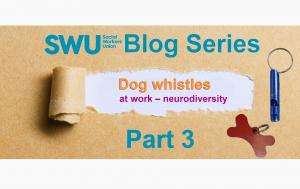SWU Blog Part 3: Dog whistles at work – neurodiversity

Deb Solomon is a practicing social worker, Chair of the BASW Neurodivergent Social Workers SIG, and Co-Chair of the BASW Equality, Diversity and Inclusion (EDI) Advisory Group. SWU has invited her to share her experiences with dog whistles in the workplace as part of this blog series.
Thank you SWU for the invitation to write this blog. It has been a cause for reflection, and I realise that I have been influenced by the “dog whistles” I have encountered in society throughout my life. One such example is a dismissive sentiment I have heard expressed many times: “ADHD is just an excuse for bad behaviour.” This particular dog whistle shows a lack of understanding of ADHD and goes so far as to suggest that it is not a real medical condition – which is shocking and ableist.
I was diagnosed with ADHD in 2020 and, as a 43 year old woman, I was totally surprised at this diagnosis. On reflection, I had always been very well behaved as a child, other than gazing out the window and not focusing in class.
My research following my diagnosis of course showed me a more accurate picture of ADHD and Neurodiversity in general – one that was not in sync with the dog whistles I had been hearing. However, the uneducated and pointed comments about ADHD and Neurodiversity that I’ve heard follow me. I have been told repeatedly how “everyone is a bit ADHD” and how having better organisation and “better sleep hygiene” will fix me.
The impact that these comments have is that they prompt me to mask. To fit in. Which, for a long time, meant that I was working three to four extra hours every day to try and keep up with the work because I found it difficult to focus in a busy noisy office. If I took myself off to work somewhere quiet I would be at risk of not being a “team player” so I tried my best. I would be easily distracted by the noise, the harsh lighting, the constant interruptions and would have to catch up in the evening.
I did ask for support when my case load was particularly high and I knew I was struggling. However, my struggles were attributed to my diagnosis and not the very high challenging caseload. When I said I felt stressed, instead of being offered support I was told, “Well, you know what you can be like.” That made me feel belittled, unheard and alone.
The impact of these dog whistles used within my workplace is that I felt that if I asked for any support I was admitting an inability to do my job. This is not on.
It is essential for employers to create a psychologically safe workspace in order to get the best out of their workforce. I know how I work and what strengths I bring.
Watch the “Stepping stones towards decent working conditions” webinar video – organised by the SWU Campaign Fund – to hear more about how Deb took action after finding that life trying to “fit in” at work was leading to exhaustion, burnout, and mental health issues.
Continue reading this blog series to learn about what dog whistles are and about different types of dog whistle discrimination from people who have experienced it first-hand: